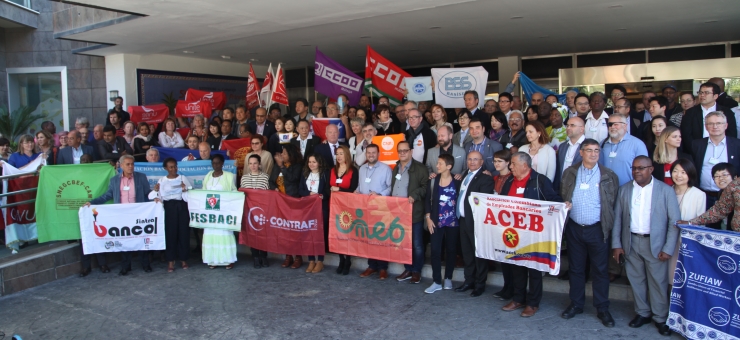UNI Finance -- organizing strong unions to tackle the changing world of work

At the UNI Finance Conference in Torremolinos, over 400 union activists and delegates exchanged their local and international experiences of the changing world of work and the challenges facing workers and unions. Digitalisation and AI are reshaping the way we work, and the finance sector has been one of the first to feel the changes. Delegates heard stories from unions all over the world about how they are facing up to both the issues, and the opportunities presented by a rapidly changing world of work.
Delegates vowed to combat the negative impacts of digitalisation on workers, but also to capitalize on the potential afforded by digitalization to organize workers and collectively bargain. Unions agreed that collective bargaining and global agreements must be used as tools to make sure that that workers have access to reskilling and upskilling rather than facing rampant retrenchments.
UNI Finance’s Brazilian World President, Rita Berlofa, was unanimously re-elected by an energetic conference. “We will continue to strengthen our 3 million-strong membership," said Berlofa. "Together, we can face the challenge of digitalisation, we can keep fighting for peace and democracy, we can grow worker power and we can build strong finance unions.”
“Complicated problems require simple solutions. Our solution is to organize, organize, organize! We will continue to grow union power and fight for democracy and human rights in this changing world of work.”
From all over the world, the stories of retrenchment, job losses and inhumane sales targets were clear. However, UNI Finance and its affiliates' message to banking companies was also clear -- stop putting profit above people.
“Workers are not being future-proofed. As usual the management plan -- instead of offering reskilling and upskilling programmes -- is to cut costs and to boost profits, always at the cost of workers,” said Julia Angrisano from FSU Australia. "As unions, we will have to fight tooth and nail and bargain collectively for policies that provide dignity and justice for our members."
“Job losses have serious repercussions,” said Joe Kokela General Secretary of SASBO, who called for a national strike in September in response to the concerning trend of dismissals and job losses. “We’re facing over 10,000 redundancies in the finance sector in South Africa -- this means thousand of families going to bed hungry. We must show companies the human impact of their callous actions and make sure our members are protected. It’s essential that workers are brought along in to the company's future, rather than simply being discarded and laid off.”
Gareth Murphy from FSU Ireland gave a powerful presentation on the innovative work his union was doing on the right to disconnect and on bargaining over digital transformation. The constant connectivity of smartphones has extended the working day for working people, and many unions are advocating the "right to disconnect" as the solution to the detrimental mental health effects of always ‘being on’.
The changing world of work presents many challenges for the finance sector on work-life balance, retrenchments and recruitment, but in the middle of every difficulty, lies opportunity. UNI Finance and its affiliates are determined to break through and seize the chance to organize strong finance unions for today and tomorrow in a changing world of work.
“We must be united and work together,” said Angelo Di Cristo, Head of UNI Finance. “If we want strong finance unions, we can’t forget the struggle and the fights of the past, and we will never give up so we are strong in the future.”
UNI Finance thanked the Spanish affiliates CC.OO and UGT for making the conferences possible in Torremolinos.

